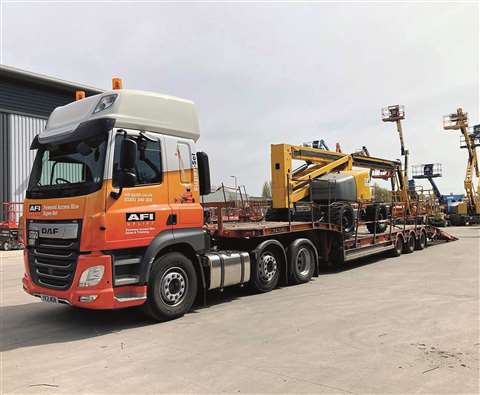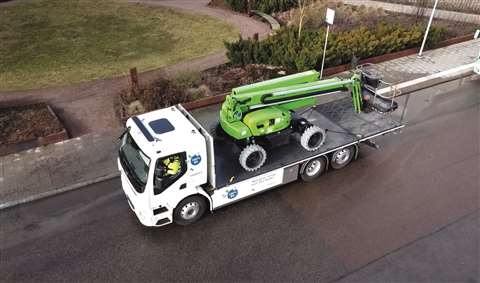Access equipment transport: What are the key safety and logistical risks?
10 June 2022
Apart from choosing the latest transport vehicles for our modern industry, there are a range of logistics and safety issues that must be considered.
While many access equipment rental companies around the world choose to hire transport equipment as required, rather than owning their own, UK-based rental company AFI runs a large fleet and works closely with its truck and chassis suppliers and employees to make them as productive and safe as possible.
 One of AFI’s fleet of delivery trucks. (Photo: AFI)
One of AFI’s fleet of delivery trucks. (Photo: AFI)
The company runs a mix of Mercedes, DAF, MAN and Scania vehicles, as well as 32, 26 and 16 tonne tractor units and rigid vehicles.
In total, AFI’s transport fleet boasts around 60 units, although there a few surplus vehicles that are being held back for company growth. As Nick Higgins, COO of AFI explains, this is due to the ongoing supply issues with truck manufacturers and the fact most of them are currently not taking orders. “The fleet will grow as the business grows post pandemic, especially the new division AFI Lifting, which operates telehandlers.”
The latest additions to the company’s fleet are 15 units of Montracon dual plated step-frame trailers, along with a similar number of UK large load CAT2 specification tractor units, particularly aimed at its large aerial equipment in the company’s Super-Set division.
“Our Super-Set fleet often requires movement orders due to the size of the equipment and previously we’ve dealt with these moves by having a small number of dedicated and specialised vehicles,” says Higgins, “We took the decision to transition the tractor and trailer fleet to CAT2 capability across the entire country so that we could move the Super-Set fleet like most other MEWP’s. This is designed to improve customer service and make hiring the largest equipment as easy as hiring the smaller machines.”
Safety risks in access transport
AFI has also implemented a range of initiatives aimed at reducing the impact of trucks on the environment. All vehicles have telemetry capabilities installed, which scores the driver on how efficiently they drive. In addition, all rigid vehicles are purchased with fold forward ramps to reduce drag, improve fuel efficiency and reduce emissions.
“In tests we carried out, fold forward ramps improved fuel efficiency by approximately 10%. Although we did initially try the same style of ramp on tractor units and trailers it doesn’t have the same effect due to the length of the vehicle and the air flow around them,” explains Higgins.
Trucks are fitted with anti-idle that cuts the engine out after a couple of minutes if the driver leaves them idling - this also helps improve fuel efficiency and reduce emissions.
Also, newly-purchased vehicles can be run on HVO fuel and, where available, trucks have been purchased with noise encapsulation systems to reduce noise pollution.
Most recently AFI has partnered with a leading load planning and route optimisation provider to produce a system for maximising efficient routes and loads across the UK. “The aim of this is to reduce the amount of miles travelled per delivery and collection,” says Higgins, “Again, another way to improve fuel efficiency and reduce emissions.”
All AFI trucks also come with the latest features including deck fall protection, deck lighting and extendable spotlights to help in the dark and multiple tie down points.
Among the safety risks in the transport of access equipment is the well-documented issue of loading and unloading, says Higging, but so too is the movement of the equipment between sites, especially if it is not secured correctly.
All AFI drivers are IPAF trained as operators and also in loading and unloading. They are also mentored by AFI Driver Ambassadors; some of the company’s most experienced drivers who take new starters under their wing after they have passed the IPAF courses. The new drivers spend the first few weeks with a Driver Ambassador learning all aspects of the job and, when ready, they are signed off to work alone.
Higgins adds, “Another big challenge, especially for new drivers, is load configuration. With there being such a range of equipment of all shapes, sizes and weights, learning how to best load a truck to maximise load capacity is a real skill. This is where time with our Driver Ambassadors is vital.”
On the subject of securing loads, AFI has a strict policy in line with the UK government’s Department of Transport guidance. It includes an internal course that teaches drivers around these issues and focuses on the rules about load restraint. For example, all drivers are taught that they must use a minimum of four separate tie down points based on the government guidance, which states: ‘The chains/straps forming the restraining system used should be arranged in such a way so that failure or slackening of a single component does not render the remainder of the system ineffective.’
As Higgins reiterates, “This can only be achieved by having at least four independent tie down points.”
The drivers are also taught that 100% of the weight of the equipment being transported needs to be secured in a forward direction - it is only 50% of the load weight in a sideways or backwards direction. This means a machine weighing 6 tonnes needs straps and chains capable of securing 6 tonnes in a forward direction… it teaches the drivers to calculate their restraint system in line with the law.
Driver initiatives
In addition, AFI ensures it has the driving resource to cope with most situations. A number of night drivers are employed to move equipment around the country while the roads are quieter and the company employs floating drivers to cover sickness and holidays, as well as putting in place a recent initiative for trainee HGV drivers.
The company also insists that its drivers wear PPE at all times and must use harnesses in booms even though they are only loading/unloading them. “We also insist that all battery powered equipment is loaded and unload using a winch,” says Higgins.
Electric delivery
Kranpunten’s move into green transport is notable for the company’s design of an electric truck for access equipment.
 Kranpunten’s electric truck was designed with partner Swerock. (Photo: Kranpunten)
Kranpunten’s electric truck was designed with partner Swerock. (Photo: Kranpunten)
The company does not operate its own transport vehicles but works closely with its logistics partners to influence the choice of their trucks, which led to it development of an electric truck with one of its service partner Swerock.
The company is striving to reduce its carbon footprint for transportation. “For a few years now, we have been demanding biofuel and HVO100. We also hope that the new electric truck is just the first of many more”.
Echoing the point made by AFI, Kranpunkten says the biggest safety risk, when it comes to transport is driving around busy depots, where there are numerous people and activities taking place, as well as unloading and loading. The company adds, “We try to plan our transports very well ahead and co-load different orders as far as possible. Good foresight is crucial and this is something we try to convey to our customers.”
Kranpunkten’s electric truck went into operation in March. It is the first time a fully electric flatbed truck has been used in Sweden, and is the result of a collaboration between construction materials and services supplier Swerock, Kranpunkten and Volvo Trucks. The vehicle is being operated in central Gothenburg’s environmental zone 1.
Weighing in at 27 tonnes, the truck is used to deliver electric aerial platforms across a range of platforms, with 15-20 deliveries being made
every day.
STAY CONNECTED



Receive the information you need when you need it through our world-leading magazines, newsletters and daily briefings.
CONNECT WITH THE TEAM








